Sign up here to receive an invitation to our monthly conversations!
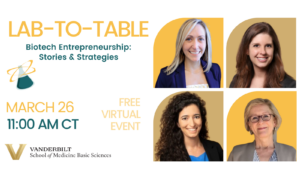
Tuesday, March 26, 2024, 11:00 a.m.-12:00 p.m. CT
“Biotech Entrepreneurship: Stories & Strategies”
One-third of biotech executives are women, a statistic that shows progress toward gender diversity in industry leadership. This trend, however, is juxtaposed against a stark reality: In the U.S., only 13 percent of venture capital funding goes to startups with a woman on the founding team. These figures reflect the persistent challenges faced by entrepreneurs, particularly women, in getting funding to bring their ideas to fruition.
Some other challenges entrepreneurs face: How do you grow an idea into a thriving business? What strategies fuel success in biotech? How do you navigate a highly regulated sector like biotech? What advice can innovators give to entrepreneurs?
In honor of Women’s History Month, the next installment of the Vanderbilt University School of Medicine Basic Sciences’ Lab-to-Table Conversations will explore the landscape of biotech entrepreneurship with an all-female panel.
Join Margaret Read, general manager of corporate alliances, Scientific Collaboration Director Ancora Innovation, Center for Technology Transfer and Commercialization, and an expert panel to explore these topics and more:
- Elizabeth Ann Stringer (PhD’10): chief scientific officer of Nashville Biosciences, founding member of axialHealthcare
- Karrie Dudek (PhD’21): CEO of Eupalinos Inc., ASPIRE to Innovate Postdoctoral Fellow, consultant to the nascent medical device company Gait Guide through the Wond’ry Innovation Consulting Program
- Shabnam Eghbali: co-founder of Theia, a nonprofit that empowers women to change health care, CTTC innovation ambassador, resident physician of internal medicine at VUMC
This virtual event is free and open to the public.
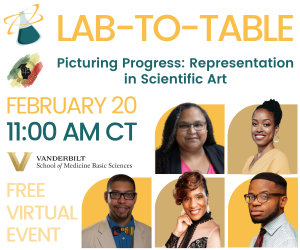 Tuesday, February 20, 2024, 11:00 a.m.-12:00 p.m. CT
Tuesday, February 20, 2024, 11:00 a.m.-12:00 p.m. CT
“Picturing Progress: Representation in Scientific Art”
Join us for Picturing Progress: Representation in Scientific Art, an online Lab-to-Table Conversation from the Vanderbilt University School of Medicine Basic Sciences on Feb. 20 at 11:00 a.m. CT. Registration is required.
As we celebrate this year’s Black History Month’s theme, “African Americans in the Arts” let’s connect the science of medical illustrations with real-life health consequences. A recent study found that only 4.5 percent of images in medical textbooks show dark skin. A lack of education on how illnesses present on different skin types contributes to misdiagnoses or disregard of dermatological symptoms in non-white patients, presenting a serious issue in the quality of patient care for both present and future minoritized individuals. Recent medical illustrations have highlighted the disparity in representation in educational texts, aiming to educate the next generation of medical professionals on how to approach diverse skin types.
What is the current state of representation in health care images? How do biases affect other areas of biomedical research, education, and medicine? In what ways has the lack of representation in medical illustrations negatively impacted the mental and emotional well-being of minoritized individuals seeking medical information or treatment?
Join Antentor Hinton Jr., assistant professor of molecular physiology and biophysics, and an expert panel to explore these questions and more during the next Lab-to-Table Conversation from the Vanderbilt University School of Medicine Basic Sciences. The virtual event will be on Tuesday, Feb. 20 at 11:00am CT and will feature the following panelists:
- Angela Byars-Winston: CCHE associate director, professor in the University of Wisconsin-Madison department of medicine
- Chidiebere Ibe: Forbes featured medical illustrator
- Chrystal Starbird: Assistant Professor in the Department of Biochemistry and Biophysics at the UNC Chapel Hill
- Ni-ka Ford: founder of Enlight Visuals
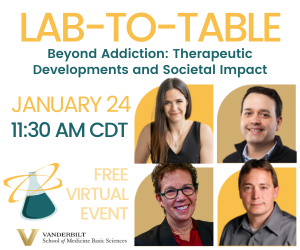 Wednesday, January 24, 2024, 11:30 a.m. – 12:30 p.m.
Wednesday, January 24, 2024, 11:30 a.m. – 12:30 p.m.
“Beyond Addiction: Therapeutic Developments and Societal Impact”
In the United States, around 40 million people have substance problems, affecting more individuals than cancer, diabetes, or heart problems. Although substance use disorders are treatable, many people don’t receive the help they need. Stigma, a lack of drug development progress, and insufficiently trained medical professionals all hinder individuals with addiction from getting proper treatment.
What is the neuroscience of addiction, and how does it impact individuals, families, and communities? What is the current state of therapeutics for substance use disorders?
Join Kristine Yoon, a pharmacology graduate student and an expert panel to explore these questions and more during the next Lab-to-Table Conversation from the Vanderbilt University School of Medicine Basic Sciences. The virtual event will be on Wednesday, Jan. 24 at 11:30am CT and will feature the following panelists:
- Erin Calipari, associate professor of pharmacology and director of the Vanderbilt Center for Addiction Research
- Craig Lindsley, executive director of the Warren Center for Neuroscience Drug Discovery and University Professor of Pharmacology, Biochemistry and Chemistry, who holds the William K. Warren, Jr. Chair in Medicine
- William (Bill) Stoops, University of Kentucky associate director for clinical research, substance use priority research area and faculty affiliate of Center on Drug and Alcohol Research
- Jan Hoffman, behavioral health and health law report for the New York Times
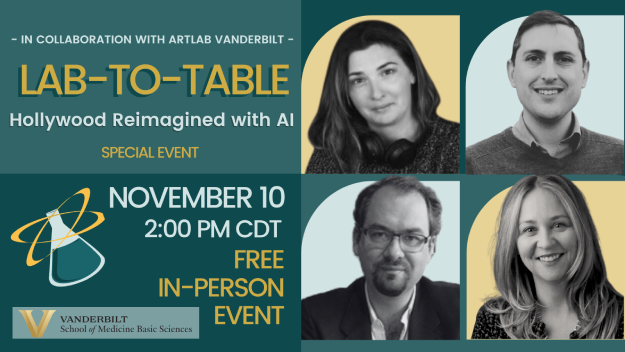 Friday, November 10, 2023, 2:00 p.m. – 3:00 p.m. CST, Sarratt Cinema – Vanderbilt University, 2301 Vanderbilt Place
Friday, November 10, 2023, 2:00 p.m. – 3:00 p.m. CST, Sarratt Cinema – Vanderbilt University, 2301 Vanderbilt Place
“Hollywood Reimagined with AI: Film Screening and Discussion”
In the digital age, artificial intelligence is changing the film industry. From scriptwriting to pre- and post-production, AI is becoming a tool and source of inspiration for filmmakers and the stories they tell. It has also been a driving factor in the recently ended 148 day writer’s strike, because of concerns about the use of AI and its potential to take an already-limited number of jobs from screenwriters.
Partnering with ArtLab and Grand Challenge Initiative, the next Basic Sciences Lab-to-Table Conversation, “Hollywood Reimagined with AI” will take place on Friday, Nov. 10 at 2 p.m. CT at Sarratt Cinema.
This event marks the first in-person Lab to Table event. It will include a screening of the undergraduate student-produced film “On the Dying Grass”, which was produced during their summer ArtLab internship.
Kendra Oliver, director and founder of ArtLab and assistant professor of pharmacology, will moderate a discussion about science, self, AI and Art at Vanderbilt and beyond.
She will be joined by panelists:
- Ole Molvig, assistant professor of history, assistant professor of communications of science and technology and physics
- Claire Sisco King, associate professor of communication studies, chair of the cinema and media arts department and past-editor of Women’s Studies in Communication
- David Thorstad, assistant professor of philosophy
There will be a reception following the panel discussion and film screening, including a presentation of AI-inspired fashion developed by students affiliated with the the Wond’ry Fiber Arts Build Lab.
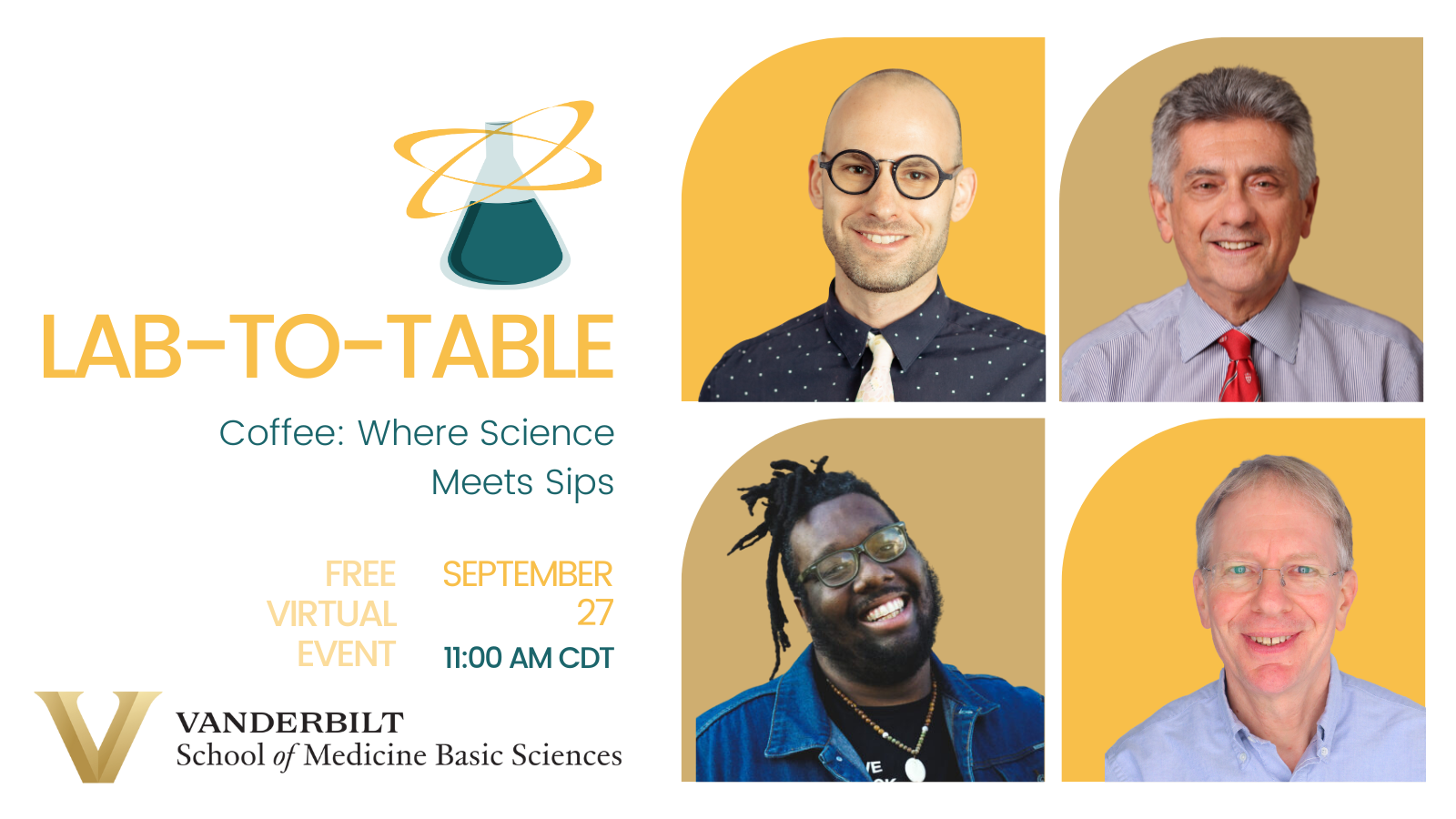
September 27, 2023, 11:00 a.m. – 12:00 p.m. CT, via Zoom
“Coffee: Where Science Meets Sips”
Coffee is one of the most sought-after commodities in the world and is a multibillion-dollar global industry. This beverage has been around for centuries, and some scholars credit coffee for fueling the ideas of the Enlightenment.
Today, coffee is versatile. It can be found in coffee shops, offices, homes, and stores. Research shows that 75% of Americans drink coffee every day, enjoying the wide range of flavors, bean varieties, and brewing methods this caffeinated beverage has to offer.
But what is the science of coffee and its health benefits? How does coffee impact both individuals and communities? And how is this research impacting the coffee industry?
Join Aaron Conley, director of external affairs, partnerships, and communications at the Vanderbilt University School of Medicine Basic Sciences, to delve into these questions and more during the next Basic Sciences Lab-to-Table Conversation, “Coffee: Where Science Meets Sips.”
The virtual event will feature the following panelists:
- Edward Fischer, co-founder of the Coffee Equity Lab, co-founder and director of the Institute of Coffee Studies and the Cultural Contexts of Wellbeing Initiative, professor of anthropology at Vanderbilt
- Peter Martin, co-founder of the Institute of Coffee Studies, professor of psychiatry and behavioral sciences, professor of pharmacology at Vanderbilt
- Bartholomew Jones, founder of cxffeeblack in Memphis, and an industry leader in diversifying coffee
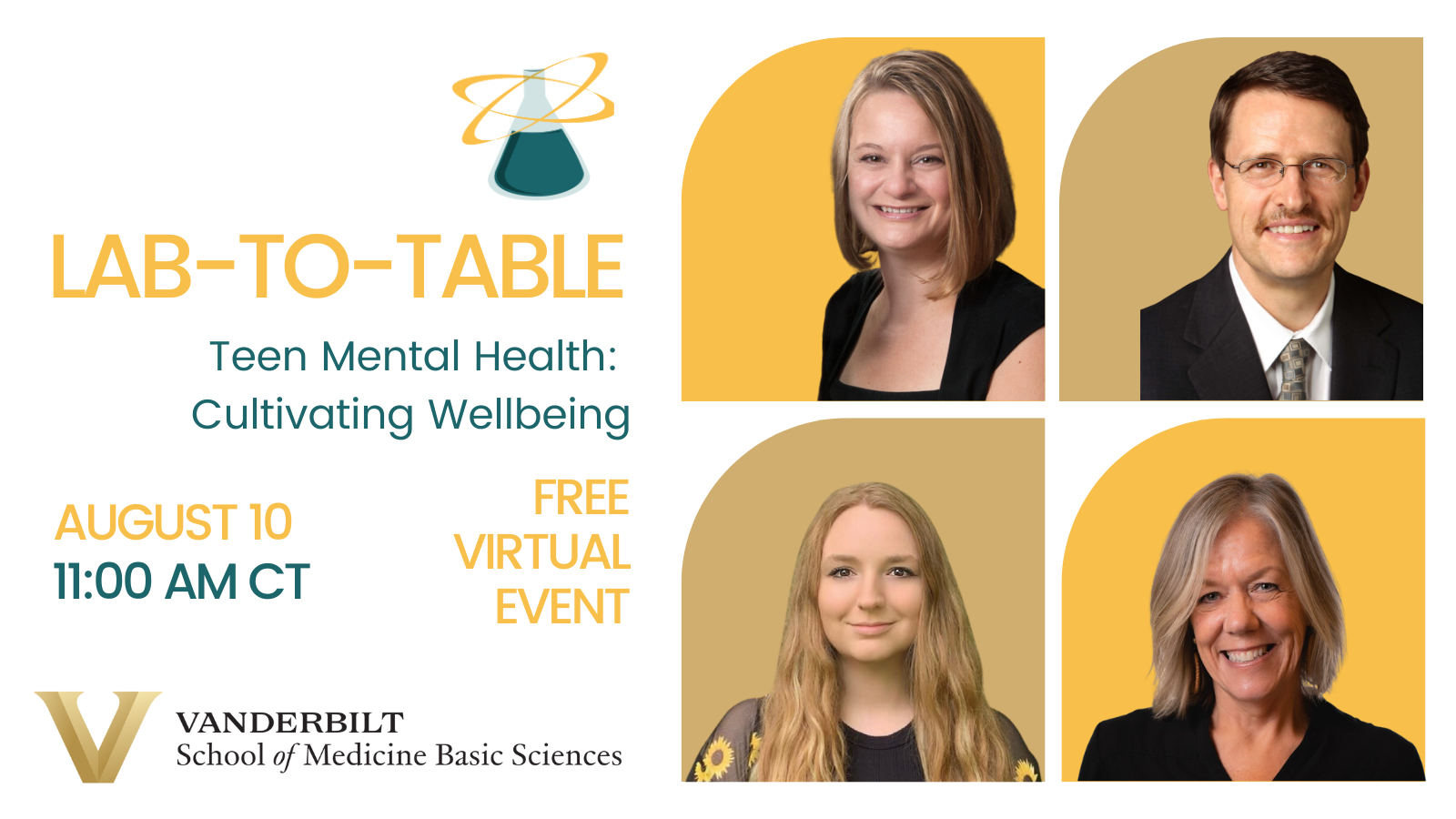
August 10, 2023, 11:00 a.m. – 12:00 p.m. CT, via Zoom
“Teen Mental Health: Cultivating Wellbeing”
Adolescence is a crucial development period socially, emotionally, and intellectually, but many teens are experiencing mental health adversities during this key period of life. According to the CDC’s Youth Risk Behavior Surveillance System, teens experiencing depression and suicidal thoughts has increased by approximately 40% in the past ten years before the pandemic. The pandemic only exacerbated these issues. The World Health Organization notes that now “one in seven 10-19-year-olds experiences a mental disorder, accounting for 13% of the global burden of disease in this age group.” This could include addiction, depression, anxiety, schizophrenia,
among others. So, why have we seen such growth in mental health adversities for teens in the last few decades? What does neuroscience say about the development of these diseases as well as their treatment? How does this impact brain development? What tactics and treatments exist for teens to cultivate wellbeing? How do we as a society address this important issue?
Join Lisa Monteggia, Ph.D., Barlow Family Director of the Vanderbilt Brain Institute and professor of pharmacology, as she delves into these questions and more during the next Basic Sciences Lab-to-Table Conversation, Teen Mental Health: Cultivating Wellbeing. The event will take place on August 10 at 11:00 a.m.–12:00 p.m. CDT
and will feature the following panelists:
- Kristen Gilliland, Ph.D.: Director of outreach and advocacy programs at the Warren Center for Neuroscience Drug Discovery,
- Layne Grace: Addiction treatment coordinator and mental health advocate, and
- Dr. Stephan Heckers, M.D., MSc: Chair and William P. and Henry B. Test Professor of the department of psychiatry and behavioral sciences
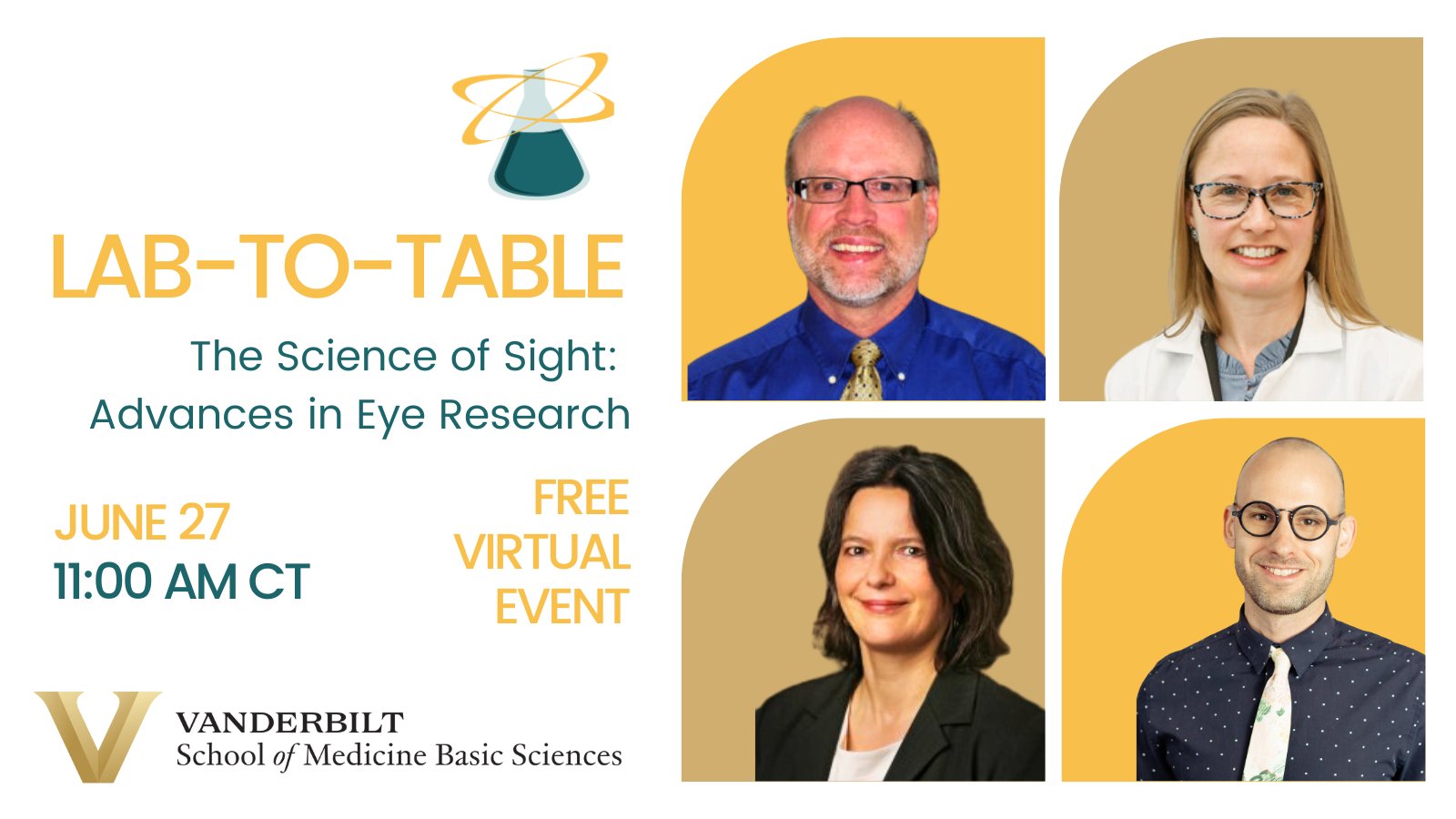
June 27, 2023, 11:00 a.m. – 12:00 p.m. CT, via Zoom
“The Science of Sight: Advances in Eye Research”
As the baby boomer generation continues to grow older, age-related eye diseases such as cataracts, age-related macular degeneration, and glaucoma are becoming even more prevalent. According to the National Eye Institute, over half of all Americans 80 years or older either have cataracts or have had surgery to treat cataracts. Additionally, ten percent of adults aged 50 or older have early stages of AMD and three million Americans have glaucoma.
Eye researchers at Vanderbilt and beyond are working on understanding both how the eyes form these diseases as they age and how to treat or regenerate eye tissue. So, what are current treatments for these diseases? How are scientific discoveries changing the future of these diseases? And how are new technologies moving these discoveries forward?
In honor of Cataracts Awareness Month, join Aaron Conley, director of external affairs, partnerships, and communications at the Vanderbilt University School of Medicine Basic Sciences, as he delves into these questions and more during the next Basic Sciences Lab-to-Table Conversation, Science of Sight: Advances in Eye Research.
The event will feature the following panelists:
- Sabine Fuhrmann, Ph.D.: Associate professor of ophthalmology and visual sciences and cell and developmental biology,
- Tonia Rex, Ph.D.: Associate vice chair for translational research, Marlene and Spencer Hays Director in Translational Vision Research, and professor of ophthalmology and visual sciences, and
- Kevin Schey, Ph.D.: Professor of biochemistry, chemistry, and ophthalmology and visual sciences, and director of core facilities at the Mass Spectrometry Research Center.
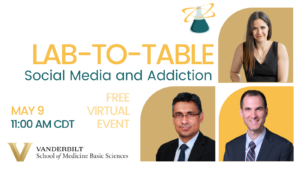
May 9, 2023, 11:00 a.m. – 12:00 p.m. CT, via Zoom
“Social Media and Addiction”
The pressures on mental health and wellness since the onset of the COVID-19 pandemic has significantly increased addiction and overdose cases in the United States. Community is an essential building block of recovery as it helps people exist in sobriety with others, something that was affected by limited in-person interactions during the harshest parts of the pandemic. Social media has become a community space for individuals struggling with addiction or who are in recovery, destigmatizing addiction and providing connection. However, the complicated nature of social media means that while it creates visibility and provides space for community it can also trigger the brain in ways similar to addiction.
So, how is social media use leading to much-needed conversations about addiction and recovery? How is it building broader community within the recovery space? And how do its complexities affect someone in recovery who’s trying to engage with it?
Join Erin Calipari, associate professor of pharmacology and associate director of the Vanderbilt Center for Addiction Research, as she delves into these questions and more during the next Lab-to-Table Conversation from the Vanderbilt University School of Medicine Basic Sciences.
The event will take place on May 9 at 11:00 a.m.–12:00 p.m. CDT and will feature the following panelists:
- David Marcovitz – Associate professor of psychiatry and behavioral sciences and director of the Division of Addiction Psychiatry at Vanderbilt University Medical Center.
- Sanchit Maruti – Associate professor of psychiatry at the University of Vermont College of Medicine, attending inpatient psychiatrist, and medical director of the Inpatient Psychiatry Service and the Addiction Treatment Program at the UVM Medical Center.
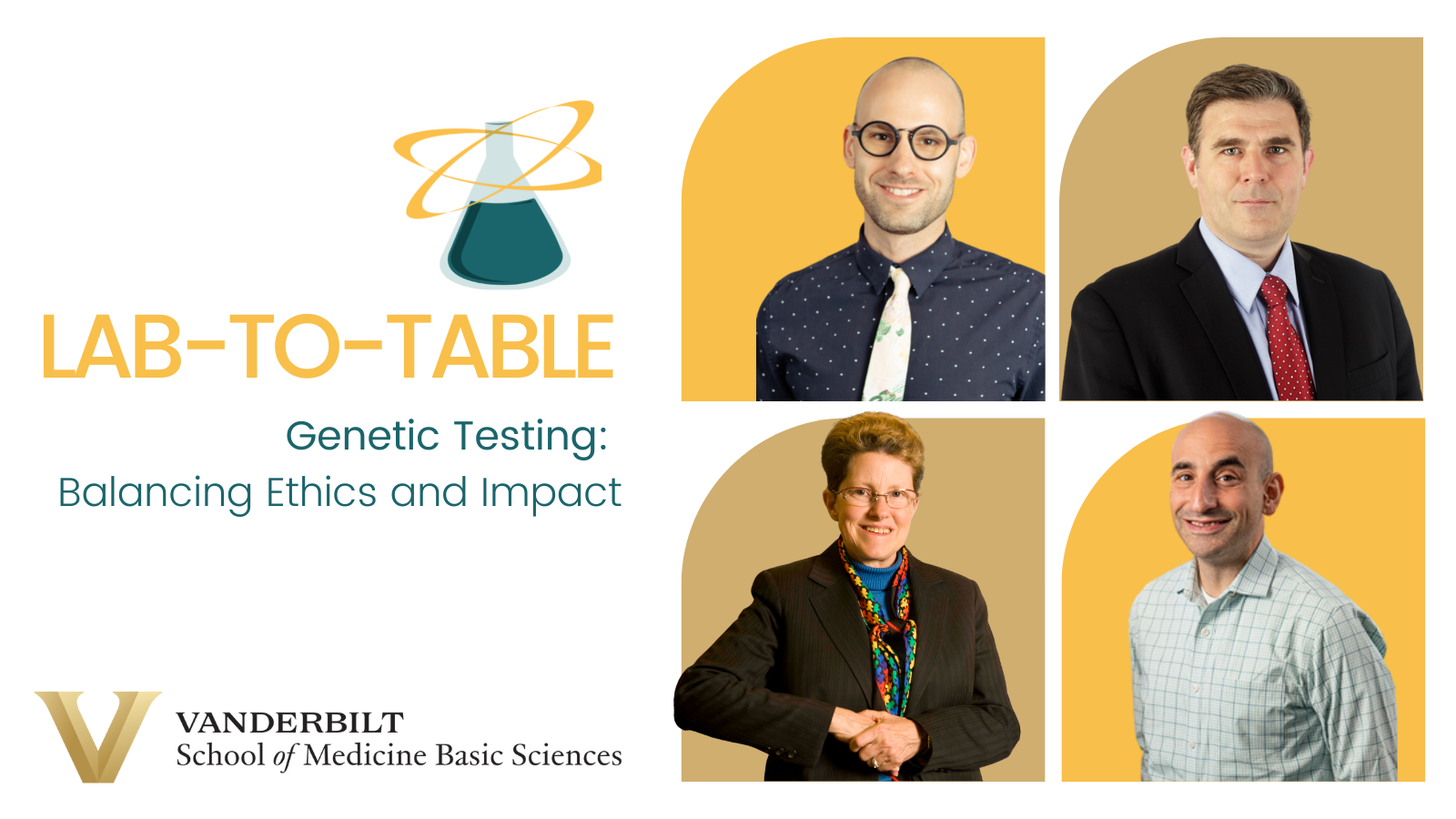
March 28, 2023, 11:00 a.m. – 12:00 p.m. CT, via Zoom
“Genetic Information: Balancing Ethics and Impact”
The Human Genome Project took over 13 years and $2.7 billion to complete the first genetic human sequencing. Now, 20 years since its completion, a full genetic sequencing costs hundreds of dollars, takes less than a few weeks, and has been integrated into medical care, genealogy, and forensics, among other spaces. Given the newness of genomic information being integrated into medicine, business, criminal justice, and people’s personal lives, many questions exist about how this data can best be used for the good of health and society, as well as the ethics of privacy and the potential problems with availability of one’s genomic information.
Join Aaron Conley, director of external affairs, partnerships, and communications, as he delves into these questions and more during the next Lab-to-Table Conversation from the Vanderbilt University School of Medicine Basic Sciences.
The panel features:
- Ellen Wright Clayton, J.D., M.D. – Craig-Weaver Professor of Pediatrics, professor of law and health policy, co-founder of the Center for Biomedical Ethics and Society, and international expert in law and genomics,
- Bradley Malin, Ph.D. – Accenture Professor of Biomedical Informatics, Biostatistics, and Computer Science, vice chair for research affairs in the Department of Biomedical Informatics, and co-directs the Center for Genetic Privacy and Identity in Community Settings (GetPreCiSe), and
- Daniele Podini, Ph.D. – Professor and chair of the Department of Forensic Sciences at George Washington University, an expert in the use of forensic genetics in the criminal justice system.
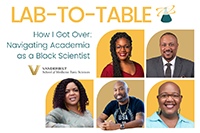
February 27, 2023, 11:00 a.m. – 12:00 p.m. CT, via Zoom
“How I Got Over: Navigating Academia as a Black Scientist”
How can Black people resist absorbing negative messages they encounter in STEM? How can the academic community in the life sciences be more aware and inclusive? The virtual Lab-to-Table Conversation at 11 a.m. on Feb. 27 will discuss some of the challenges that Black trainees and faculty face in their fields of study and the strategies they have used to be successful in the face of these challenges. They will also discuss how inclusion and equity can increase representation and bolster the upward trajectory of Black scientists.
Felysha Jenkins, Ph.D., assistant dean of diversity, equity and inclusion, will delve into these questions and more with the panel, hosted by the Vanderbilt University School of Medicine Basic Sciences. The discussion will provide tips and tools to current students, faculty and staff and give examples of how the environment—and the people within it—can lead to a hospitable climate for Black scientists.
The panel features:
- Lillian Brady, Ph.D. – incoming assistant professor, psychiatry and behavioral neurobiology, University of Alabama at Birmingham; research instructor, Vanderbilt University
- Breonte Guy, Ph.D. – associate professor of psychological sciences at Winston-Salem State University
- Ebony McGee, Ph.D. – professor of education, diversity and STEM (science, technology, engineering and mathematics) education, Department of Teaching and Learning
- Steven Townsend, Ph.D. – Stevenson Professor of Chemistry and professor of pathology, microbiology and immunology
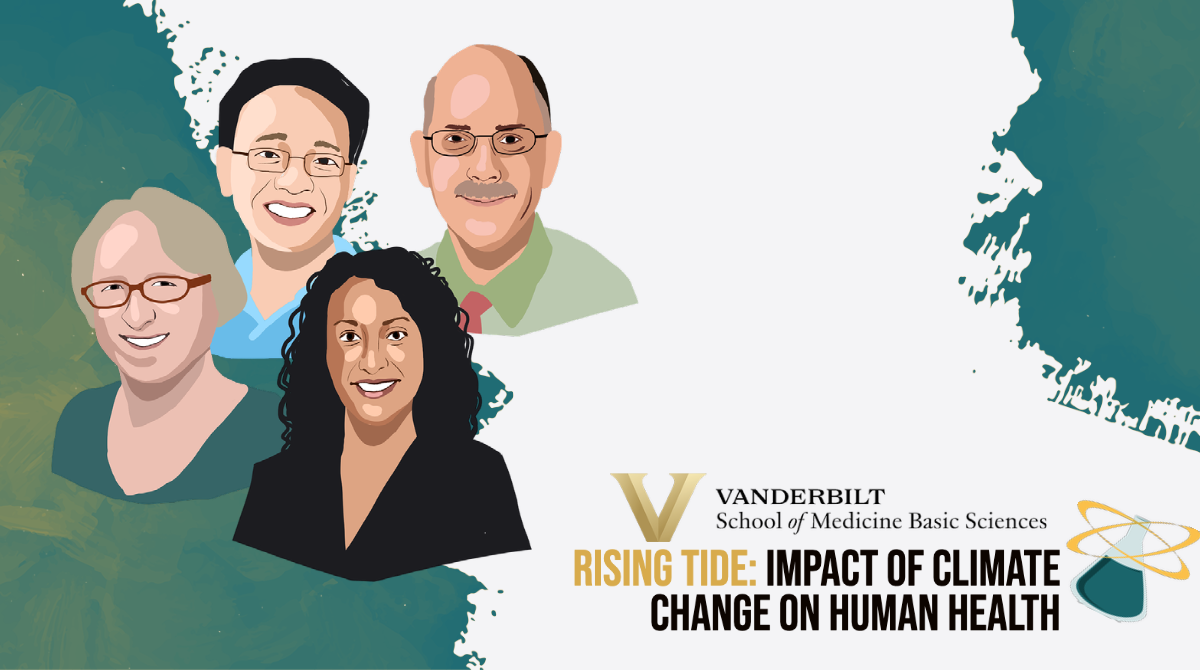
December 20, 2022, 12:00 p.m. – 1:00 p.m. CT, via Zoom
“Rising Tide: Impact of Climate Change on Human Health”
The impact of climate change can be felt throughout the world in a variety of ways. It is increasing air pollution, diminishing water quality, and causing more frequent extreme weather events to name but a few examples.
Such climate-related changes are complex and can negatively affect human health, leading to increases in cardiovascular disease, asthma, allergies, and other issues.
So, how does climate change affect human health? And how is biomedical research working to limit the impacts of climate on health?
Join Charles Sanders, associate dean of research and professor of biochemistry, as he delves into these questions and more during the next Lab-to-Table Conversation from the Vanderbilt University School of Medicine Basic Sciences.
The panel features:
- Dr. Eva R. Parker – Assistant professor of dermatology at Vanderbilt University Medical Center, expert on medical, inpatient, and cosmetic dermatology with interests in the intersection between climate change and global health.
- Manuel Ascano Jr. – Associate professor of biochemistry and pathology, microbiology and immunology and expert on RNA and RNA-binding proteins.
- Louise Rollins-Smith – Professor of pathology, microbiology, and immunology and biological sciences and expert on eco-immunology with a specialty in host and pathogen interactions.
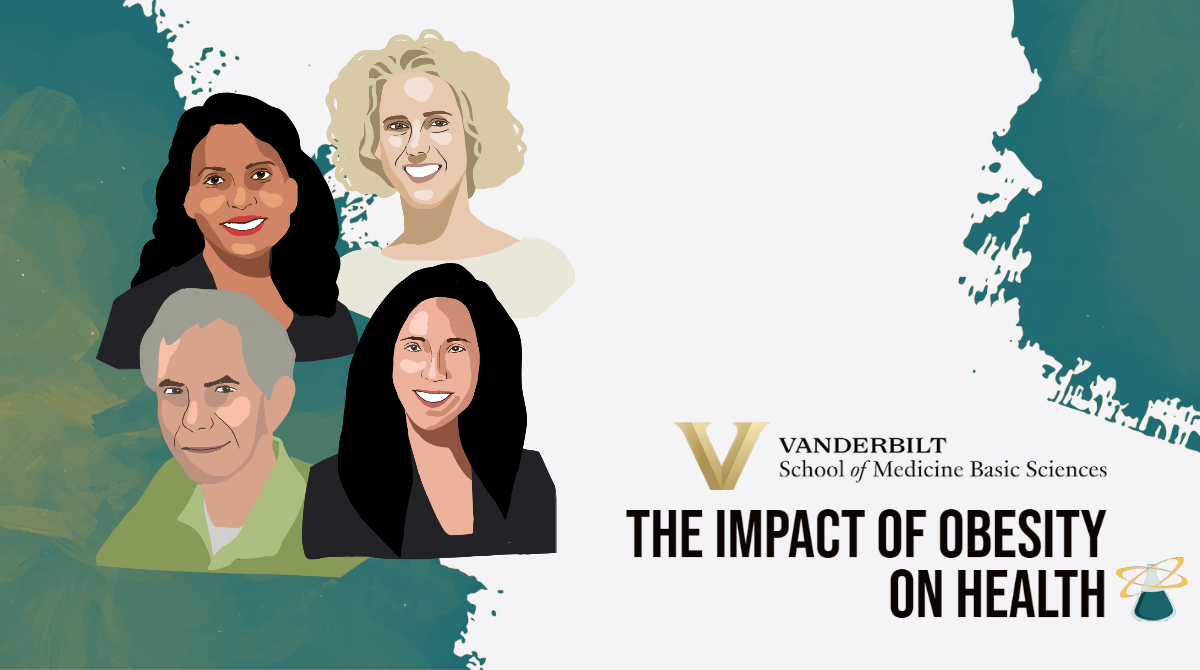
November 30, 2022, 12:00 p.m. – 1:00 p.m. CT, via Zoom
“Impact of Obesity on Health”
Obesity is a well-known risk factor for diseases including heart disease, some cancers, and diabetes. It is also a visible and often thought individualistic risk factor of choice or inaction. But what are the scientific mechanisms of how obesity impacts the body? And what are the genetic components to why certain individuals struggle more with weight gain and weight loss?
Join Alyssa Hasty, Ph.D., as she explores these topics and others in the next Lab-to-Table Conversation from the Vanderbilt University School of Medicine Basic Sciences. Hasty, Cornelius Vanderbilt Professor in the department of molecular physiology and biophysics, is an expert in obesity research, recently focusing on the impact of yo-yo dieting on inflammation.
The event will feature panelists:
- Shari Barkin, M.D., MSHS – Chair of the department of pediatrics and physician-in-chief of Children’s Hospital of Richmond at Virginia Commonwealth University. Dr. Barkin is the former director of pediatric obesity research at Vanderbilt University Medical Center.
- Owen McGuinness, Ph.D. – Professor of molecular physiology and biophysics, an expert in regulation of metabolic response to inflammation and interaction with nutrition.
- Gitanjali Srivastava, M.D. – Associate professor of medicine in the division of diabetes, endocrinology, and metabolism, medical director of Vanderbilt Obesity Medicine, and co-director of the Vanderbilt Weight Loss Center.
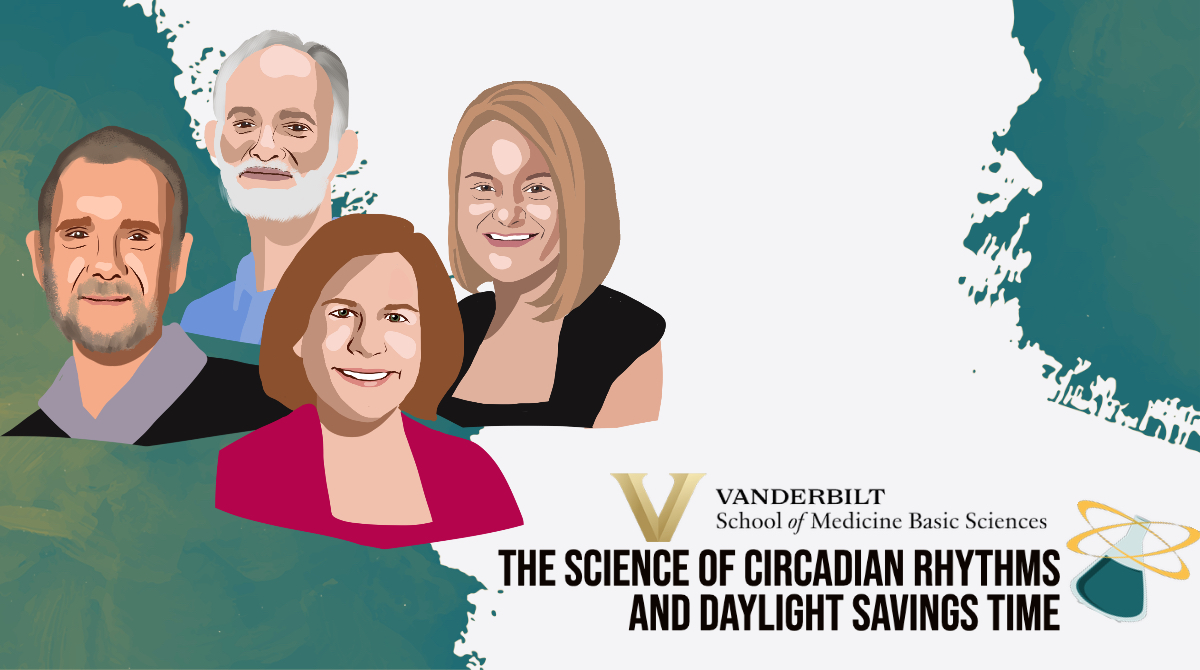
October 26, 2022, 1:00 p.m. – 2:00 p.m. CT, via Zoom
“The Science of Circadian Rhythms and Daylight Savings Time”
With daylight savings time ending November 6, many of us will experience a shift in our sleep that could impact us for a few days or more. But how does the time change impact our health, specifically our circadian rhythms?
Join Lisa Monteggia, Ph.D., as she explores these topics in the next Lab-to-Table Conversation from the Vanderbilt University School of Medicine Basic Sciences. Monteggia, the Barlow Family Director of the Vanderbilt Brain Institute, and professor of pharmacology, is a renowned neuroscientist leading brain related research across the university and medical center through the VBI.
The panel features:
- Carl Johnson, Ph.D. – Cornelius Vanderbilt Chair and professor of biological sciences. Johnson is an expert in circadian rhythms.
- Beth Malow, M.D. – Division chief of sleep and professor of neurology at the Vanderbilt University Medical Center. Dr. Malow is board certified in neurology and sleep medicine.
- Douglas McMahon, Ph.D. – Stevenson Chair and professor of biological sciences. McMahon’s research focuses on neural plasticity and the central nervous system related to circadian rhythms.
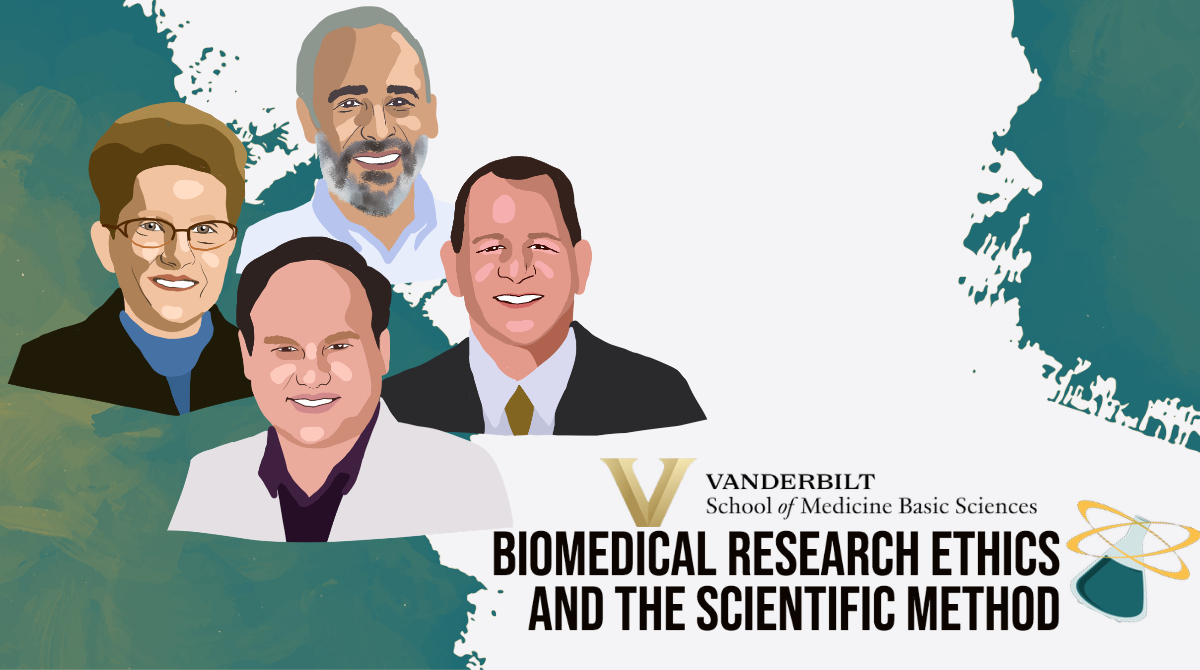
September 29, 2022, 11:00 a.m. – 12:00 p.m. CT, via Zoom
“Biomedical Research Ethics and the Scientific Method”
The COVID-19 pandemic has brought biomedical research to the forefront of conversation. From vaccine and drug development to “gain of function” research and more, questions about biomedical ethics have become dinner table conversations. But to adequately engage in a discussion on ethical best practices of biomedical research and therapeutic development, it’s important to understand exactly what the “scientific method” entails. What safeguards are in place to prevent unintentional errors or fraud? How does the scientific community think about these questions?
Join Hassane Mchaourab, Ph.D., as he explores these topics in the next Lab-to-Table Conversation from the Vanderbilt University School of Medicine Basic Sciences. Mchaourab, the Louise B. McGavock Chair of Molecular Physiology and Biophysics, is passionate about scientific integrity and regularly presents to trainees and peers about responsible conduct in research.
The event will take place on September 29 at 11:00 a.m.–12:00 p.m. CDT and will feature panelists:
- Ellen Wright Clayton, J.D., M.D. – Craig-Weaver Professor of Pediatrics, professor of law and health policy, co-founder of the Center for Biomedical Ethics and Society, and international expert in law and genomics.
- Mark Denison, M.D. – Edward Claiborne Stahlman Professor in Pediatrics, director of the Division of Pediatric Infectious Diseases, and expert in coronaviruses.
- Matthew Schrag, M.D., Ph.D. – Assistant professor of neurology and director of the Cerebral Amyloid Angiopathy Clinic; recently found signs of data fabrication in major Alzheimer’s scientific articles.
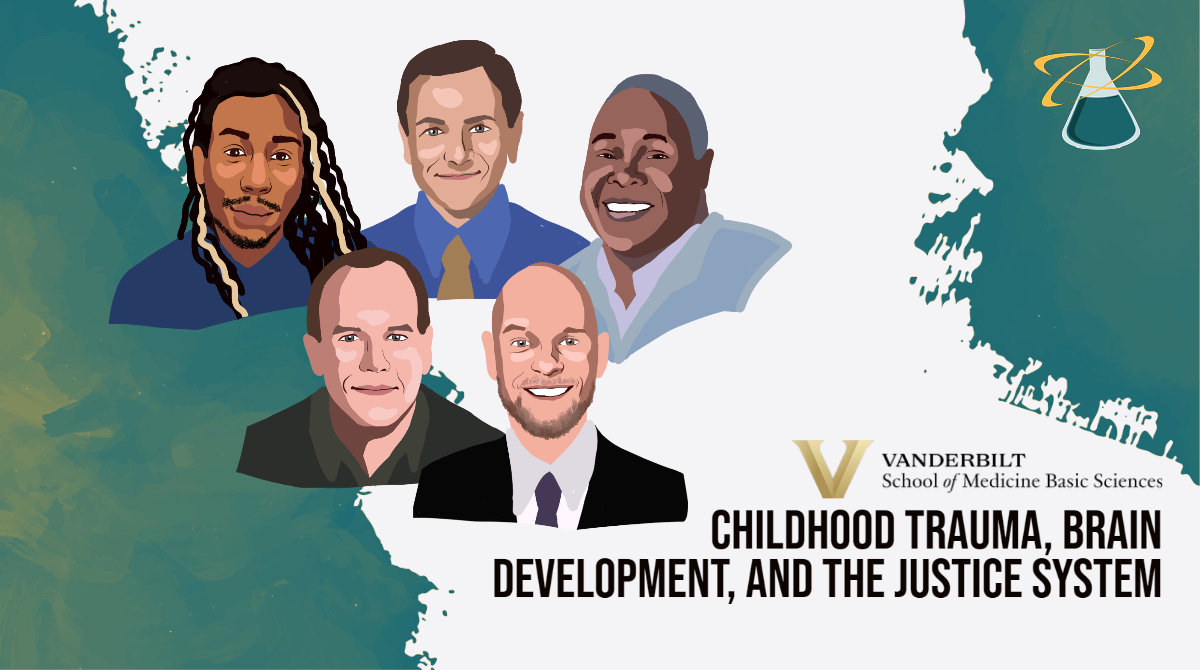
August 25, 2022, 2:00 – 3:00 p.m. CT, via Zoom
“Childhood Trauma, Brain Development, and the Justice System”
One of the largest studies ever on childhood abuse and neglect is the CDC-Kaiser Permanente adverse childhood experiences (ACE) study, which showed direct correlation of ACEs to health and well-being challenges in adolescence and adulthood including addiction and mental health. While 64% of the U.S. population has at least one ACE, 97% of the U.S. prison population has one or more according to the Compassion Prison Project. So how does childhood trauma impact brain development and behavior biologically? How does this lead to increased risk for incarceration? How can we integrate this understanding better into our justice system and diversion and prevention efforts? And how do we heal from ACEs individually and as a society?
Join Joey Barnett, Ph.D., professor of pharmacology, for the next Lab-to-Table Conversation from the Vanderbilt School of Medicine Basic Sciences in which we will explore these topics. Barnett has been volunteering with incarceration- and reentry-based programming since the 1980s.
This month, the event will take place on August 25 at 2:00 p.m.–3:00 p.m. CDT and will feature panelists:
- Pierre Cabell – musician, lead facilitator for Healing Broken Circles, and formerly incarcerated individual,
- Trina Frierson – president and CEO of Mending Hearts Inc., an organization working with women who are homeless due to addiction, most of which are in the reentry community,
- Richard Simerly, Ph.D. – Louise B. McGavock Professor of Molecular Physiology and Biophysics and expert in developmental neurobiology, and
- Mark Wallace, Ph.D. – Louise B. McGavock Chair of Neuroscience studying the neural bases of multisensory processing.
The panel will connect the neurobiology of how childhood trauma impacts brain development and behavior, its intersection with the justice system, and how we can integrate this understanding in our prevention, diversion, and restorative efforts.
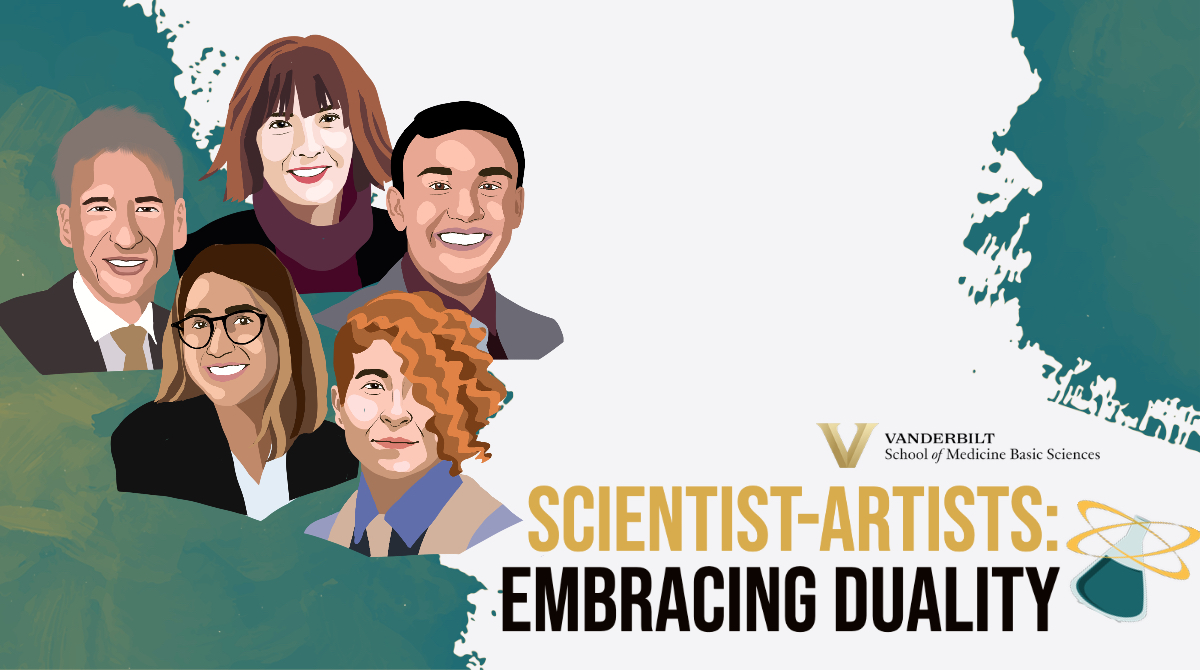
July 27, 2022, 12:00 – 1:00 p.m. CT, via Zoom
“Scientist-Artists: Embracing Duality”
In ancient times and during the Renaissance, scientists and artists were often one and the same. Today, only “scientific geniuses” are considered to be polymaths—people with extensive knowledge on a variety of subjects.
Yet, arts and creative avocations in scientists are more common than typically portrayed. Now more than ever, people are recognizing and exploring how art and science interact and influence each other, both within research fields and scientist-artists themselves.
Join Kendra Oliver, Ph.D., assistant professor of pharmacology and director and founder of ArtLab, for our next Lab-to-Table Conversation in which we will explore how a group of self-identified scientist-artists are embracing this particular duality.
This month, the event will take place on July 27 at 12:00 p.m.–1:00 p.m. CDT and will feature panelists:
• Ian Macara, Ph.D. – chair of the department of cell and developmental biology,
• Navya Thakkar – Vanderbilt alumna who studied biology and studio art and winner of the Margaret Stonewall Wooldridge Hamblet Award,
• Kate Mittendorf, Ph.D. – senior staff scientist at Vanderbilt University Medical Center, illustrator, and Vanderbilt Ph.D. graduate, and
• Jacob Steenwyk, Ph.D. – scientific consultant at LatchBio, founder and chief officer of The SciArt Shop, and Vanderbilt Ph.D. graduate.
The panel will discuss their individual identities as both scientists and artists, showcase their art and research, and discuss the influence of art on science and science on art.
The event is free, virtual, and open to the public.
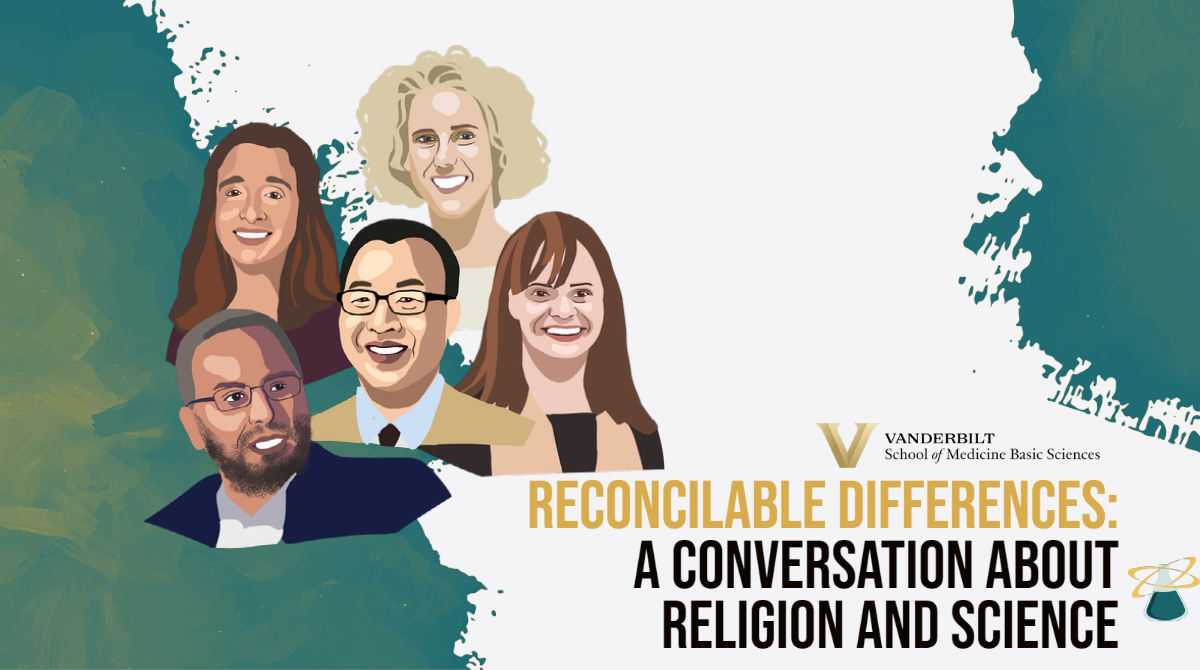 June 30, 2022, 12:00 – 1:00 p.m. CT, via Zoom
June 30, 2022, 12:00 – 1:00 p.m. CT, via Zoom
“Reconcilable differences: A conversation about religion and science”
Religion and science are often thought of as holding opposing worldviews, but what do religious leaders and scientists think about the dialogue between religion and science? Does it have to be a choice between religion or science, or is there common ground?
The panel will discuss Christian, Islamic, and Jewish perspectives about the dialogue between religion and science, how religion and science can impact each other positively, and how to stem implicit biases on both sides of the dialogue, among other topics. The panel will be moderated by:
• Alyssa Hasty, Ph.D, Cornelius Vanderbilt Professor of Molecular Physiology and Biophysics and associate dean for faculty in the School of Medicine Basic Sciences, and will feature panelists:
• Imam Ossama Bahloul, Ph.D. – resident scholar of the Islamic Center of Nashville,
• Maureen Gannon, Ph.D. – professor of medicine and associate dean for faculty development in the Vanderbilt School of Medicine,
• Paul Lim, Ph.D. – associate professor of the history of Christianity at the Vanderbilt Divinity School, and
• Rabbi Shana Goldstein Mackler – rabbi at The Temple–Congregation Ohabai Sholom in Nashville.
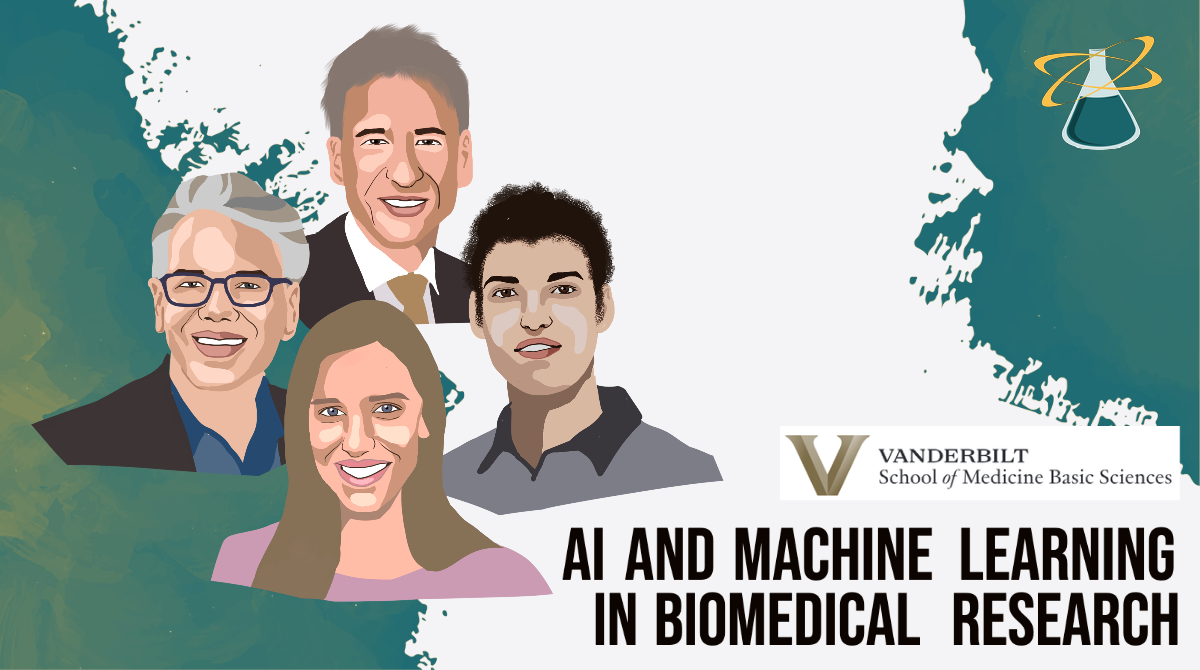 May 24, 2022, 12:00 – 1:00 p.m. CT, via Zoom
May 24, 2022, 12:00 – 1:00 p.m. CT, via Zoom
“AI and Machine Learning in Biomedical Research”
Access to big data and an increase in computation power through artificial intelligence and machine learning is changing the landscape of biomedical research. How are these new tools used and how are they leading to new discoveries? Are they able to make drug discovery cheaper, faster, and safer? What are the ethics of using these tools?
Join Ian Macara, Ph.D., chair and professor of the Department of Cell and Developmental Biology, for the next Lab-to-Table Conversation from the Vanderbilt University School of Medicine Basic Sciences. This month, the event will take place on May 24 at 12:00 p.m.–1:00 p.m. CDT and will feature panelists:
• André Bastos, Ph.D. – an assistant professor of psychology who uses computational modeling to unravel how the brain builds predictions,
• Shannon Smith – a Ph.D. student in the lab of Jens Meiler who uses machine learning for drug development, and
• Jesse Spencer-Smith, Ph.D. – Chief Data Scientist at the Vanderbilt Data Science Institute.
The panel will discuss the use and impact of artificial intelligence and machine learning on biomedical research, how it is being used for new and paradigm-shifting discoveries, and its ethics.
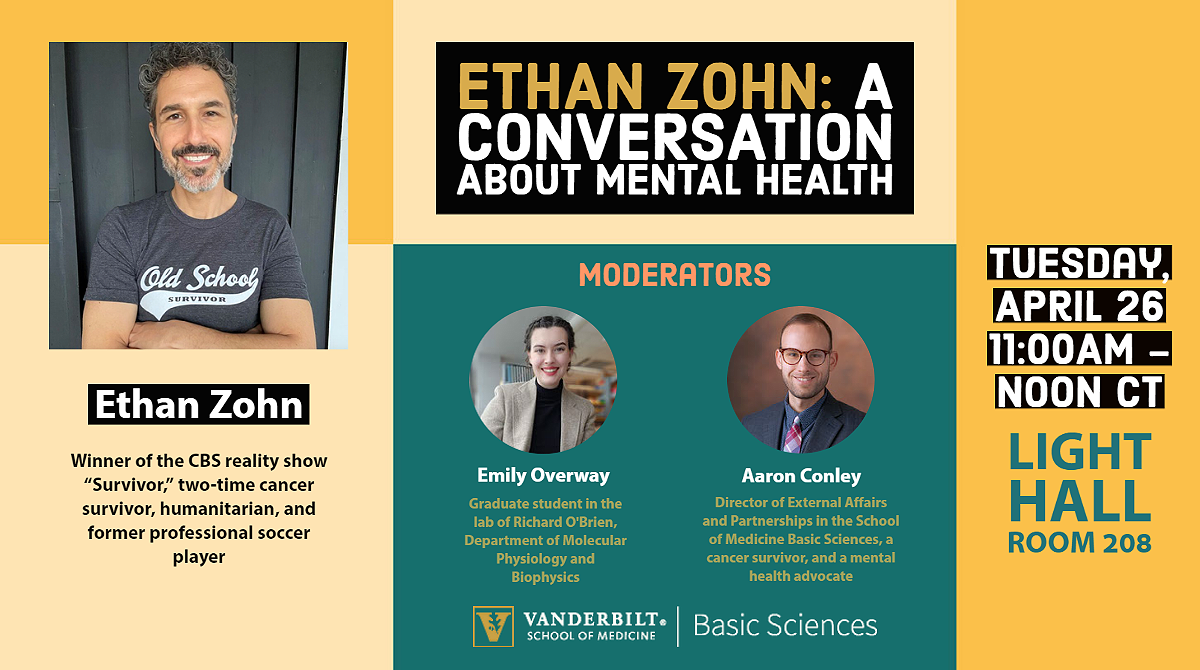
April 26, 2022, 7:00 – 8:30 p.m. CT, Blair School’s Ingram Hall
“Survivor: Intersections of Cancer and Mental Health with Ethan Zohn”
Ethan Zohn, winner of the CBS reality show Survivor, two-time cancer survivor, humanitarian and former professional soccer player, will discuss his journey with reality television, cancer, mental health and humanitarian work as part of the School of Medicine Basic Sciences’ monthly Lab-to-Table Conversations on Tuesday, April 26. The event is free and open to the public, and no registration is required. The discussion will be moderated by Larry Marnett, dean of the Vanderbilt University School of Medicine Basic Sciences and include Brian Engelhardt, associate professor of medicine of hematology and oncology at the Vanderbilt University Medical Center, and William Tansey, Ingram Professor of Cancer Research at the School of Medicine Basic Sciences.
The event will include an audience Q&A. If you would like to submit a question in advance, please fill out this form. At the end of the event, there will be a meet and greet with Zohn.
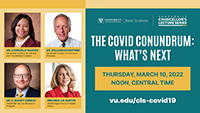 March 10, 2022, 12:00 p.m. CT
March 10, 2022, 12:00 p.m. CT
“The COVID Conundrum: What’s Next”
Panelists will talk about the trajectory of variants, global travel, and the accessibility and equity of vaccines and boosters, among other timely topics.
Chancellor Daniel Diermeier will host the event with opening remarks. The virtual panel is hosted by the Vanderbilt Chancellor’s Lecture Series in partnership with the Vanderbilt School of Medicine Basic Sciences.
The event is open to all.
The panel discussion will be moderated by Melinda J.B. Buntin, Mike Curb Professor and chair of the Department of Health Policy.
Panelists:
- Dr. Consuelo Wilkins, senior vice president and senior associate dean for health equity and inclusive excellence, and associate director of the Vanderbilt Institute for Clinical and Translational Science
- Dr. William Schaffner, professor of preventive medicine and health policy in the Division of Infectious Diseases
- Dr. C. Buddy Creech, Edie Carell Johnson Professor of Pediatrics in the Division of Pediatric Infectious Diseases and director of the Vanderbilt Vaccine Research Program
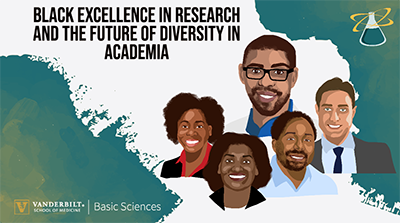 February 22, 2022, 12:00 p.m. CT
February 22, 2022, 12:00 p.m. CT
“Black Excellence in Research and the Future of Diversity in Academia”
In recognition of Black History Month, please join the monthly, virtual Vanderbilt School of Medicine Basic Sciences Lab-to-Table Conversations to celebrate Black excellence in research and to discuss the future of diversity in academia.
The webinar will be moderated by Antentor Hinton Jr., assistant professor of molecular physiology and biophysics, with the following panelists:
- Calvin Carter, Ph.D. – assistant professor of neuroscience and pharmacology at the University of Iowa and co-founder and president of Geminii Health,
- Jamaine Davis, Ph.D. – assistant professor of biochemistry and cancer biology at Meharry Medical College,
- Elsie Spencer, Ed.D. – administrative director of the National Center for Children and Families, and center administrator for the Consortium for Policy Research in Education at the Teachers College at Columbia University, and
- Brittany Taylor, Ph.D. – assistant professor of biomedical engineering at the University of Florida.
The panel will discuss the impacts of Black scientists on their fields of study, the current faculty climate and how inclusion and equity can continue their upward trajectory, STEM pipeline development and access, and hopes for the future of diversity in academia.
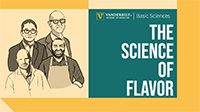 January 31, 2022, 12:00 p.m. CT
January 31, 2022, 12:00 p.m. CT
“The Science of Flavor”
Flavor combinations in food bring enjoyment, nostalgia, nutrition and conversation. But where do flavors come from? What is their chemistry? How is the scientific understanding of flavor changing? And how is this science impacting industry and restaurants?
On Monday, Jan. 31, from noon to 1 p.m. CT, the School of Medicine Basic Sciences’ monthly virtual Lab-to-Table Conversation will discuss the history of flavor science, how it has changed, and how it is being applied in the restaurant space and in industry.
The panel will be moderated by Larry Marnett, dean of the Vanderbilt University School of Medicine Basic Sciences, with panelists:
• John York, chief science officer at Impossible Foods and former chair of Vanderbilt’s Department of Biochemistry;
• Vivek Surti, Vanderbilt alumnus and founder of Tailor Nashville, named one of the best new restaurants nationally by Bon Appétit magazine in 2019; and
• Xiaodong “Sheldon” Li, founder and CEO of Ixora Taste Sciences Inc., a startup dedicated to the discovery of natural taste modulators, and an expert in taste modulation, taste receptors, and related chemistry.
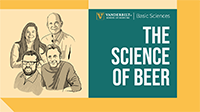 December 16, 2021, 11:00 a.m. CT
December 16, 2021, 11:00 a.m. CT
“The Science of Beer”
Beer dates to the 5th millennium BC and is one of the oldest drinks humans have produced. The process of refining the fermentation and production of beer has been part of human history. But what is the science of beer and how does it connect to biomedical research?
For the Vanderbilt School of Medicine Basic Sciences’ monthly virtual Lab-to-Table Conversation on December 16 at 11:00am – 12:00pm, join Bruce Carter, professor of biochemistry, associate director of the Vanderbilt Brain Institute, and beer science expert with panelists:
• Bailey Spaulding, JD – CEO and founder of Jackalope Brewing Company and Vanderbilt University Law School alum,
• Linus Hall, MBA – President and co-founder of Yazoo Brewing Company and Vanderbilt University Owen Graduate School of Management alum, and
• Andrzej Balinski, MS – Research core facility manager in the Vanderbilt University Department of Chemistry and beer science expert.
The panel will discuss the history of beer both globally and in Nashville, the science of beer and fermentation, how this science has changed in modern times, and how beer and fermentation science connect to biomedical processes in the body.
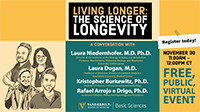 November 30, 2021, 11:00 a.m. CT
November 30, 2021, 11:00 a.m. CT
“The Science of Longevity” Biomedical science has made huge strides in understanding the mechanics of human aging, and these discoveries have drastically affected how we work to prevent disease and increase longevity.
On Tuesday, Nov. 30, 11 a.m.–noon CT, the School of Medicine Basic Sciences’ monthly virtual Lab-to-Table Conversation will bring aging research experts together and outline our current understanding of the biology of longevity, where longevity research is heading and how people can incorporate our current understanding into their day-to-day lives.
The panel will be moderated by Vanderbilt alumna Dr. Laura Niedernhofer, director of the Institute on the Biology of Aging and Metabolism at University of Minnesota, and include current Vanderbilt faculty:
Rafael Arrojo e Drigo, assistant professor of molecular physiology and biophysics
Kris Burkewitz, assistant professor of cell and developmental biology
Laura Dugan, Abram C. Shmerling, MD Chair in Alzheimer’s and Geriatric Medicine and professor of medicine at the Vanderbilt University Medical Center
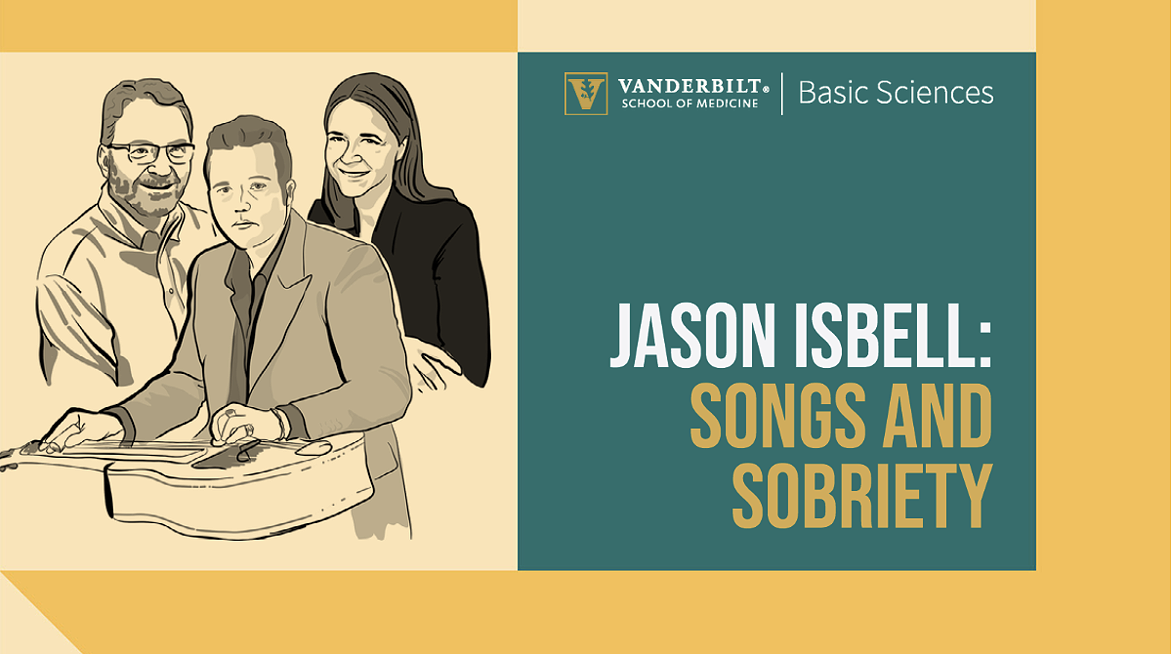 October 12, 2021, 12:00 p.m. CT
October 12, 2021, 12:00 p.m. CT
“Jason Isbell: Songs and Sobriety” Four-time Grammy award-winning musician Jason Isbell joins a panel moderated by Danny Winder, director of the Vanderbilt Center for Addiction Research, and Erin Calipari, assistant professor of pharmacology. The discussion will cover the impacts of COVID-19 on addiction and sobriety, the stigma of addiction, and the intersections of sobriety, addiction, and music. Featured guest Jason Isbell has had personal experience with addiction and sobriety, which has influenced his music and work over the last decade. This has included his 2013 album Southeastern, his first after getting sober, as well as more recent songs like “It Gets Easier” and work with Bradley Cooper on the movie “A Star Is Born.”
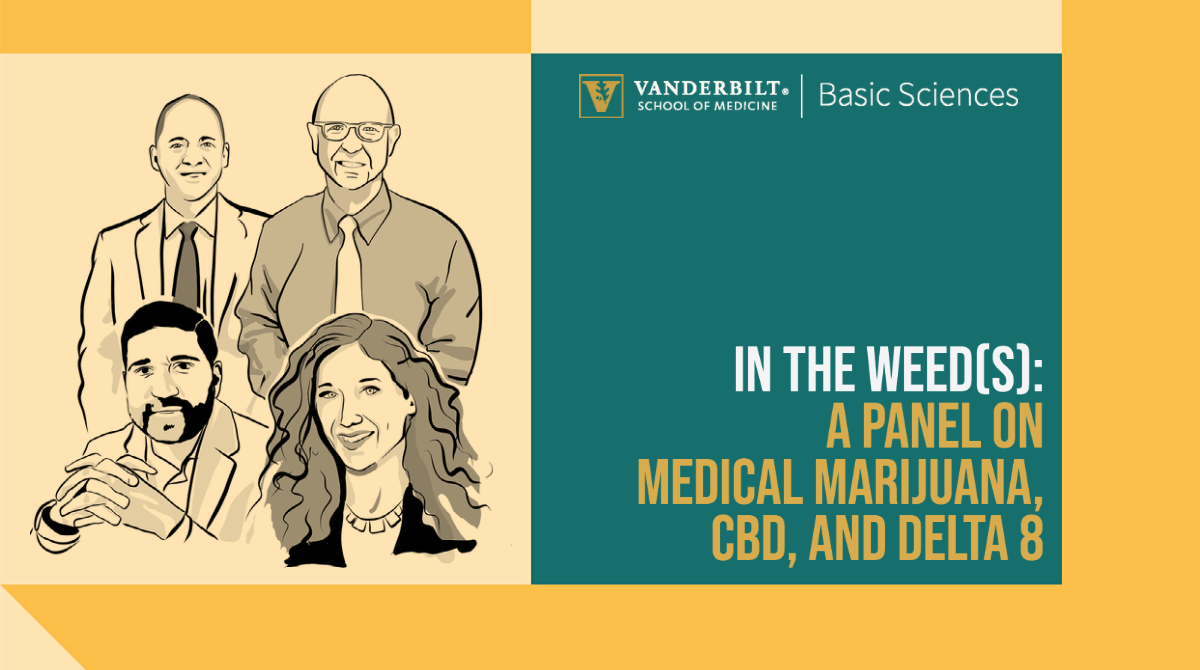 September 23, 2021, 12:00 p.m. CT
September 23, 2021, 12:00 p.m. CT
“In the Weed(s): A Panel on Medical Marijuana, CBD, and Delta 8” With the growing legalization of medical and recreational marijuana in states across the country, as well as growth in use of CBD and Delta 8, what does current science say about the efficacy of its use and its short and long-term impacts on your body? What are the current legal trends for these substances in the United States?
To delve into these questions, please join Larry Marnett, Ph.D., dean of the Vanderbilt University School of Medicine Basic Sciences, for the school’s monthly Lab-to-Table Conversation, where he will be moderating a conversation about the science of marijuana and the current legal context for its use with the following panelists:
• Ziva Cooper, Ph.D. – director of the UCLA Cannabis Research Initiative and associate professor in psychiatry and anesthesiology at UCLA,
• Robert Mikos, J.D. – LaRoche Family Chair in Law at the Vanderbilt Law School, expert on marijuana law and author of the book Marijuana Law, Policy, and Authority, and
• Dr. Sachin Patel, M.D., Ph.D., James G. Blakemore Professor of Psychiatry and Behavioral Sciences, Molecular Physiology and Biophysics, and director of the division of general psychiatry at Vanderbilt University Medical Center.
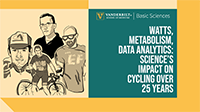 August 17, 2021, 11:00 A.M. CT
August 17, 2021, 11:00 A.M. CT
“Watts, Metabolism, Data Analytics: Science’s Impact on Cycling Over 25 Years” Over the past few decades, biomedical science has made huge strides in understanding how the human body works. New scientific insights have drastically impacted how endurance sports athletes train and eat. For the monthly Vanderbilt University School of Medicine Basic Sciences Lab-to-Table Conversation, join Matt Tyska, Cornelius Vanderbilt Chair and professor of cell and developmental biology, as he moderates a conversation about science and cycling with the following panelists:
• George Hincapie, former professional cyclist, 17-time Tour de France rider, owner of Hincapie Sportswear, and a co-host of the THEMOVE podcast,
• Bobby Julich, former professional cyclist, Tour de France veteran, Olympic medalist, cycling coach, and host of the Bobby & Jens podcast, and
• Dr. Kevin Sprouse, head of medicine for EF Education-NIPPO Pro Cycling, and sports medicine provider for PGA golfers, NFL and MLB players, Olympic track and field athletes, and more.
The panel will discuss their personal experiences with training, coaching, and medicine in cycling and how science has impacted their efforts through the years.
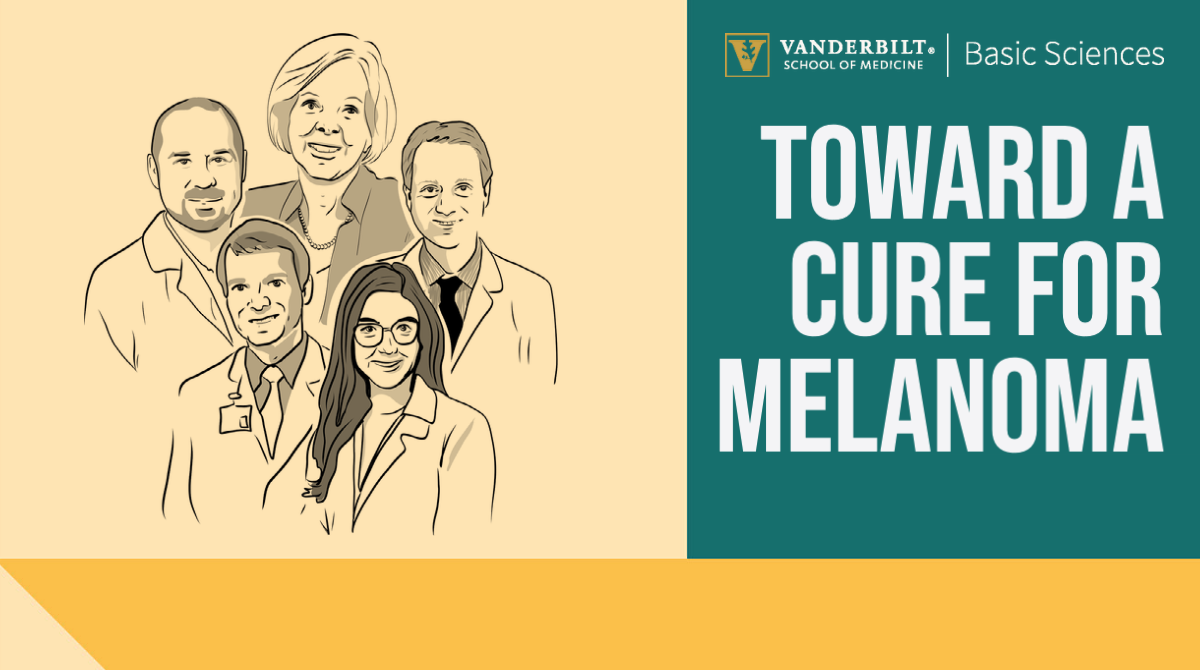 July 27, 2021
July 27, 2021
“Toward a Cure for Melanoma” With the peak of summer approaching, this panel will discuss innovative research in melanoma and how it could move the needle towards less toxic treatments and better outcomes for patients. Moderated by Ann Richmond, Ph.D., Ingram Professor of Cancer Research and professor of pharmacology, the panel will feature: Justin Balko, Pharm.D., Ph.D., associate professor of medicine and pathology, microbiology and immunology, and Leader of Molecular Oncology, Center for Cancer Targeted Therapies Researcher; Dr. Anthony Daniels, M.Sc., M.D., assistant professor of ophthalmology and visual sciences, cancer biology, and radiation oncology; Dr. Doug Johnson, M.D., M.S.C.I., assistant professor of medicine of hematology/oncology; Dr. Caroline Nebhan, M.D., Ph.D., clinical fellow in hematology/oncology.
June 17, 2021
“Origins of Life: A conversation between a cell biologist, theologian, astronomer, and philosopher” How do academics with diverse areas of expertise view the origins of life? What kind of conversation would take place among a cell biologist, a theologian, an astronomer/physicist and a philosopher if they all sat around the same table? Witness this virtual discussion hosted by the School of Medicine Basic Sciences that will bring together perspectives from single-cell biology, theology, space and time and metaphysical philosophy to explore the unique and common understandings among the fields. The discussion will be moderated by Ian Marcara, Louise B. McGavock Chair and chair of the department of cell and developmental biology. The panelists are: Ellen Armour, PhD, E. Rhodes and Leona B. Carpenter Chair in religion, gender and sexuality Lenn Goodman, Andrew W. Mellon Professor in the Humanities, and professor of philosophy Stephen Taylor, assistant professor of physics and astronomy
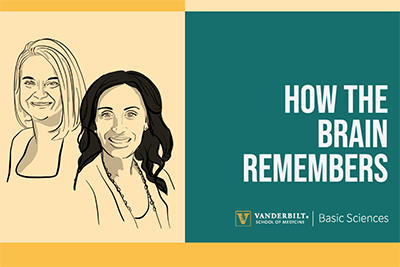 May 26, 2021
May 26, 2021
“How the Brain Remembers” — a Conversation with New York Times bestselling author and neuroscientist Lisa Genova and Vanderbilt Brain Institute Barlow Family Director Lisa Monteggia. This event was presented in partnership with Nashville-based Parnassus Books.
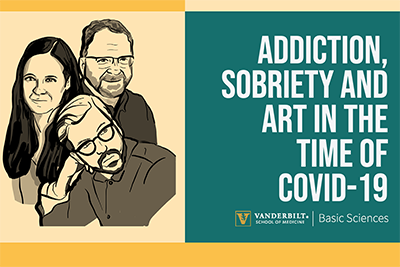 April 21, 2021
April 21, 2021
“Addiction, Sobriety and Art in the Time of COVID-19”
Featured guest, Will Welch, global editorial director of GQ magazine will join Winder and Calipari for the discussion. Welch has had personal experience with addiction and sobriety and has made discussing these issues through articles like “Creating While Clean” a focus of GQ in recent years.
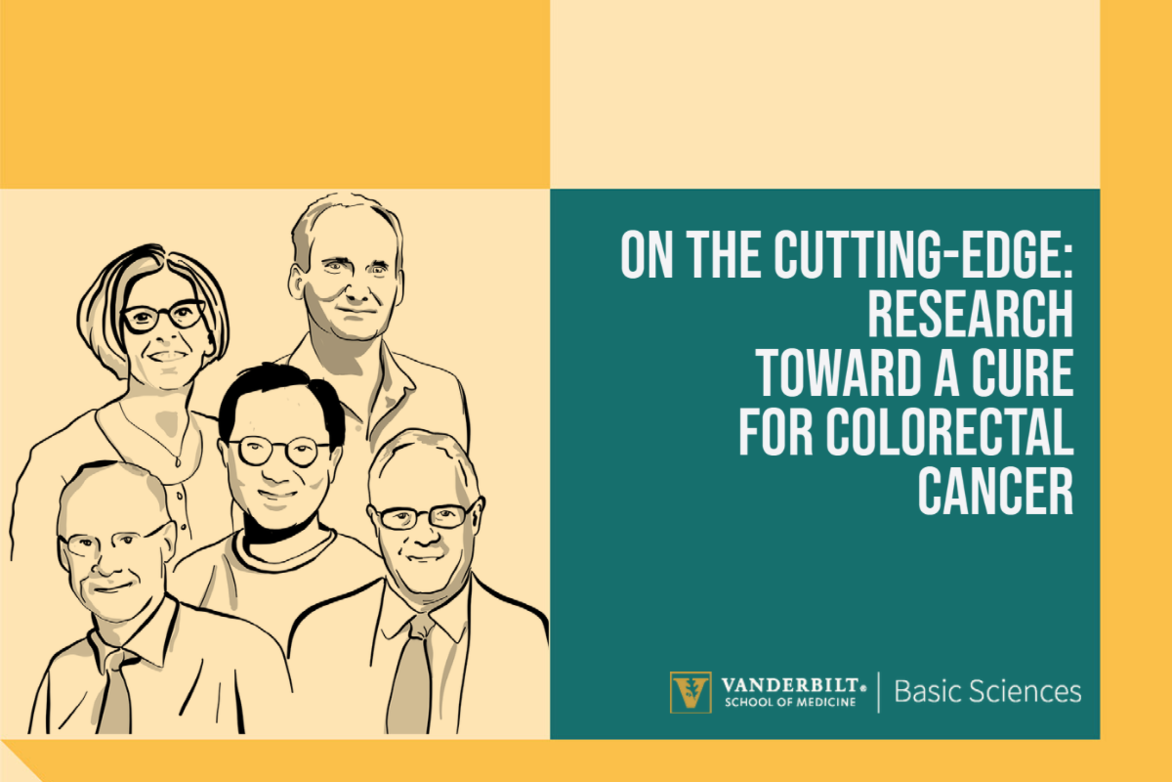 March 30, 2021
March 30, 2021
“On the Cutting-Edge: Research Toward a Cure for Colorectal Cancer”
Featuring David Cortez (moderator) and panelists Jordan Berlin, Robert Coffey, Ethan Lee, and Alissa Weaver.
View this conversation! Vanderbilt-Ingram Cancer Center colorectal cancer resources
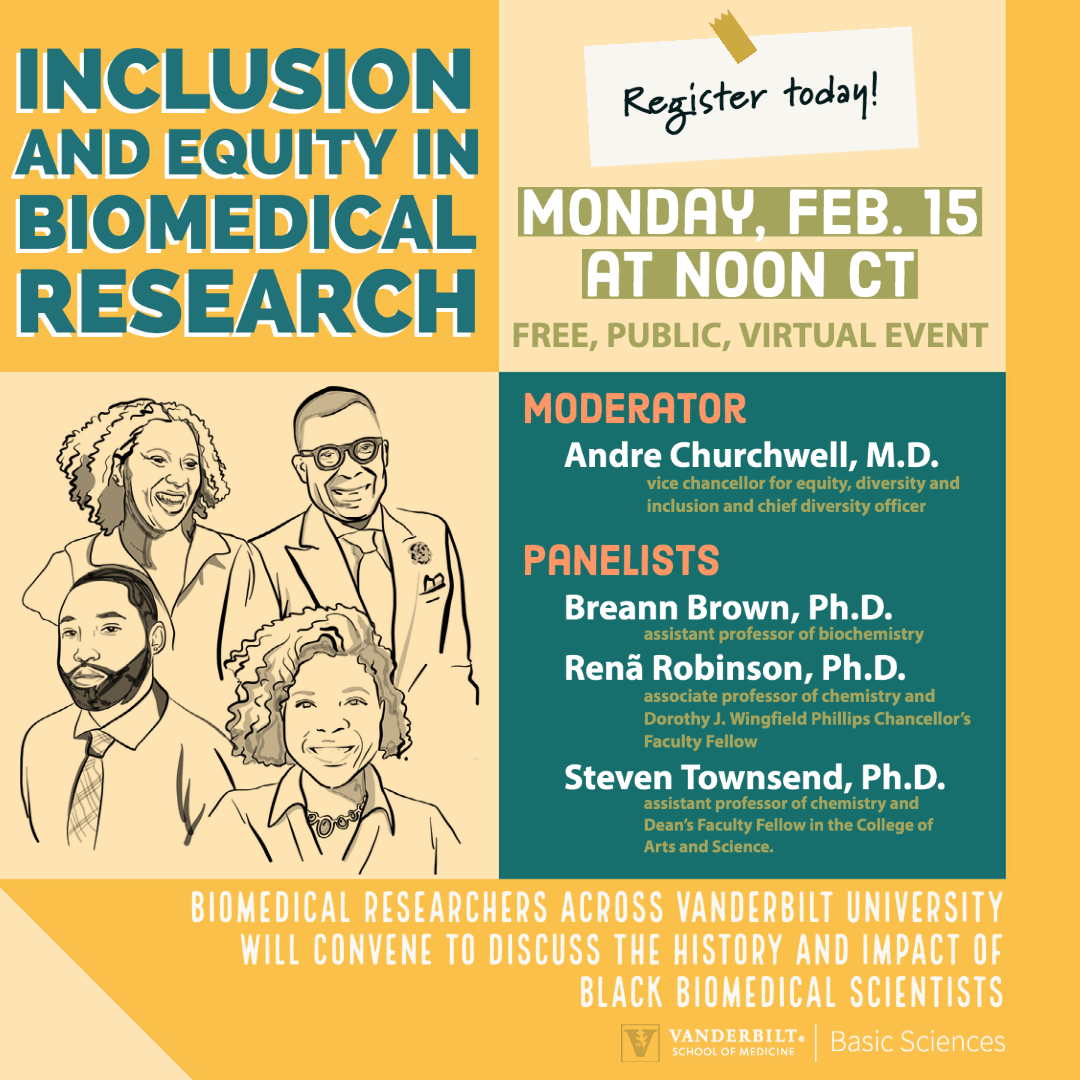 February 15, 2021
February 15, 2021
“Inclusion and Equity in Biomedical Research”
Featuring André Churchwell (moderator) and panelists Breann Brown, Renã Robinson, and Steven Townsend.
View article View this conversation!
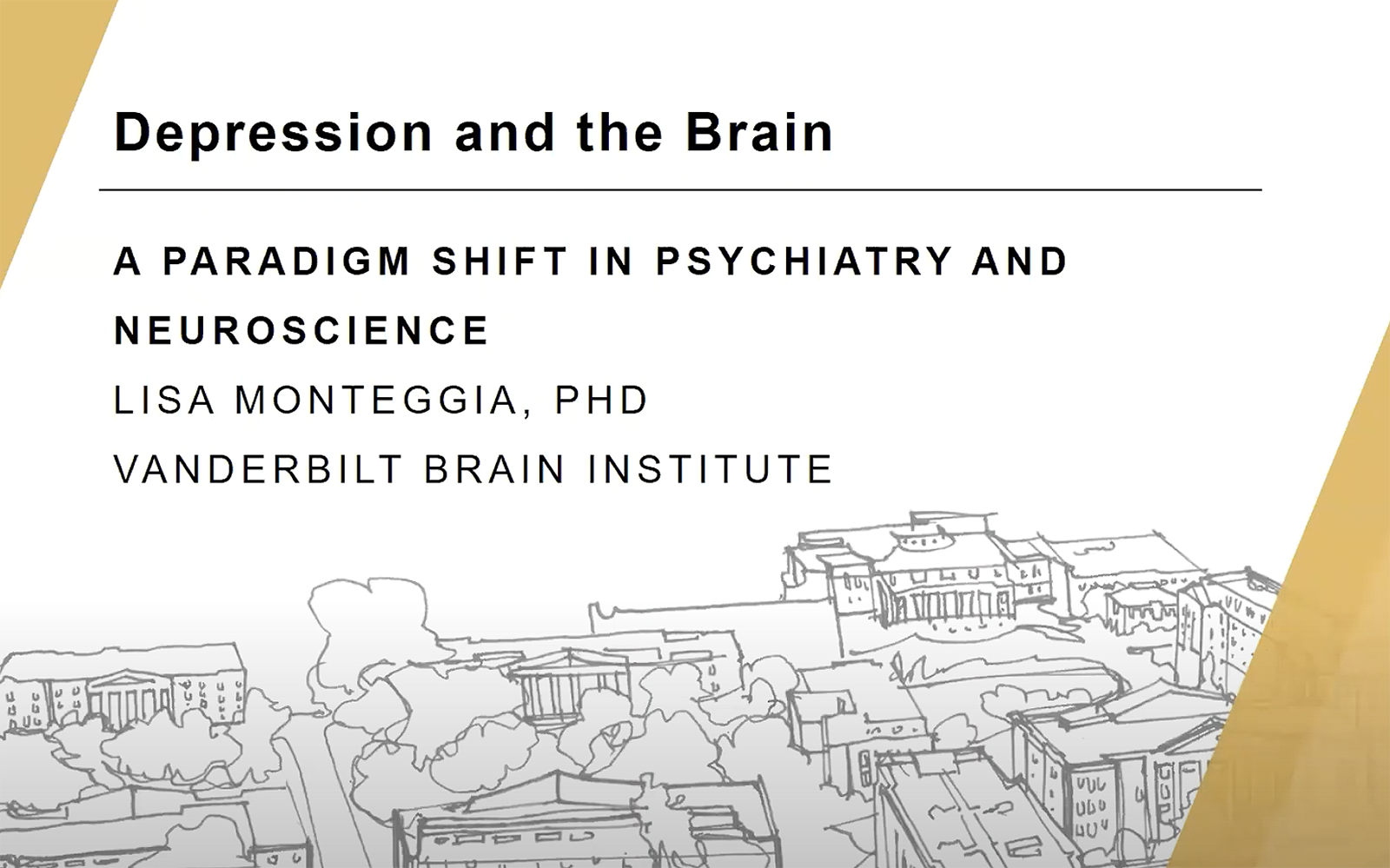 October 6, 2020
October 6, 2020
“Depression and the Brain: A Paradigm Shift in Psychiatry and Neuroscience”
October is depression awareness month. An estimated 17.3 million adults in the United States had at least one major depressive episode in 2017. This number represented 7.1% of all U.S. adults. To align with awareness on this illness, Dr. Lisa Monteggia covers the ground-breaking research occurring in basic science focused on depression, which she counts as one of our strongest research areas. Dr. Monteggia discussed the recent breakthroughs and future directions our research will take.
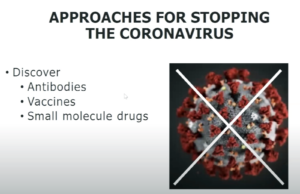 July 3, 2020
July 3, 2020
“A Promising Start to Ending Coronaviruses”
Featuring Stephen W. Fesik, Orrin H. Ingram II Chair in Cancer Research. Steve Fesik, PhD, discusses his research on protease inhibitors for coronaviruses.
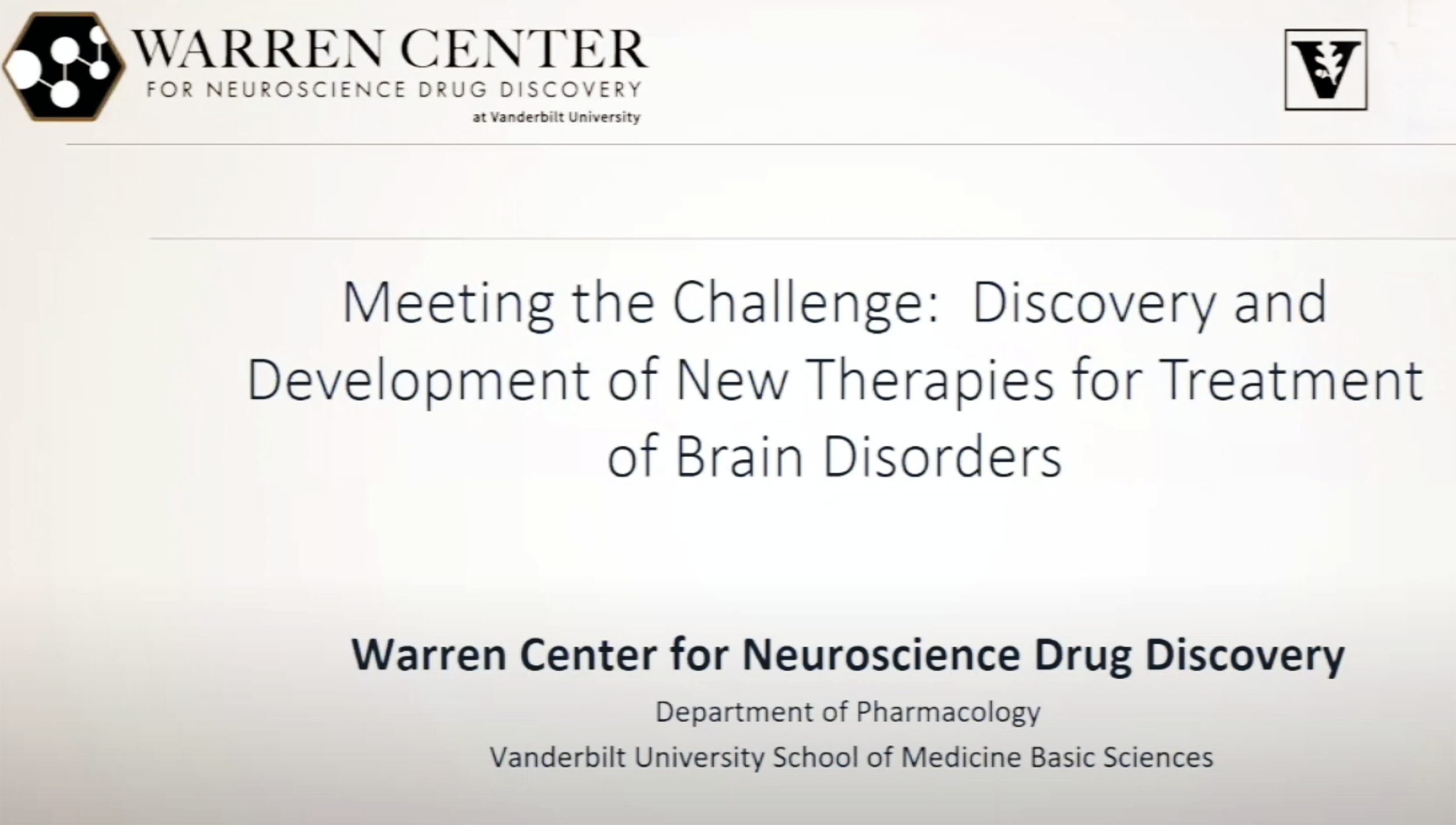 August 4, 2020
August 4, 2020
“Meeting the Challenge: Neuroscience Drug Discovery with the Warren Center”
The Warren Center for Neuroscience Drug Discovery (WCNDD) extends traditional academic pursuits in basic science to take the most exciting advances in our understanding of human disease and drug targets to a point where these breakthroughs can directly impact patient care. This is especially true in discovery of new treatment strategies for the most serious of brain disorders, such as Alzheimer’s disease, Parkinson’s disease, schizophrenia, autism, and others. By incorporating the highest level of drug discovery into academic research, the WCNDD takes scientific breakthroughs beyond the lab and toward the development of patentable and marketable drugs suited for clinical studies. Jeff Conn and Craig Lindsley give an overview of WCNDD, their neuroscience research and describe the impact of the transformative gift from The William K. Warren Foundation.